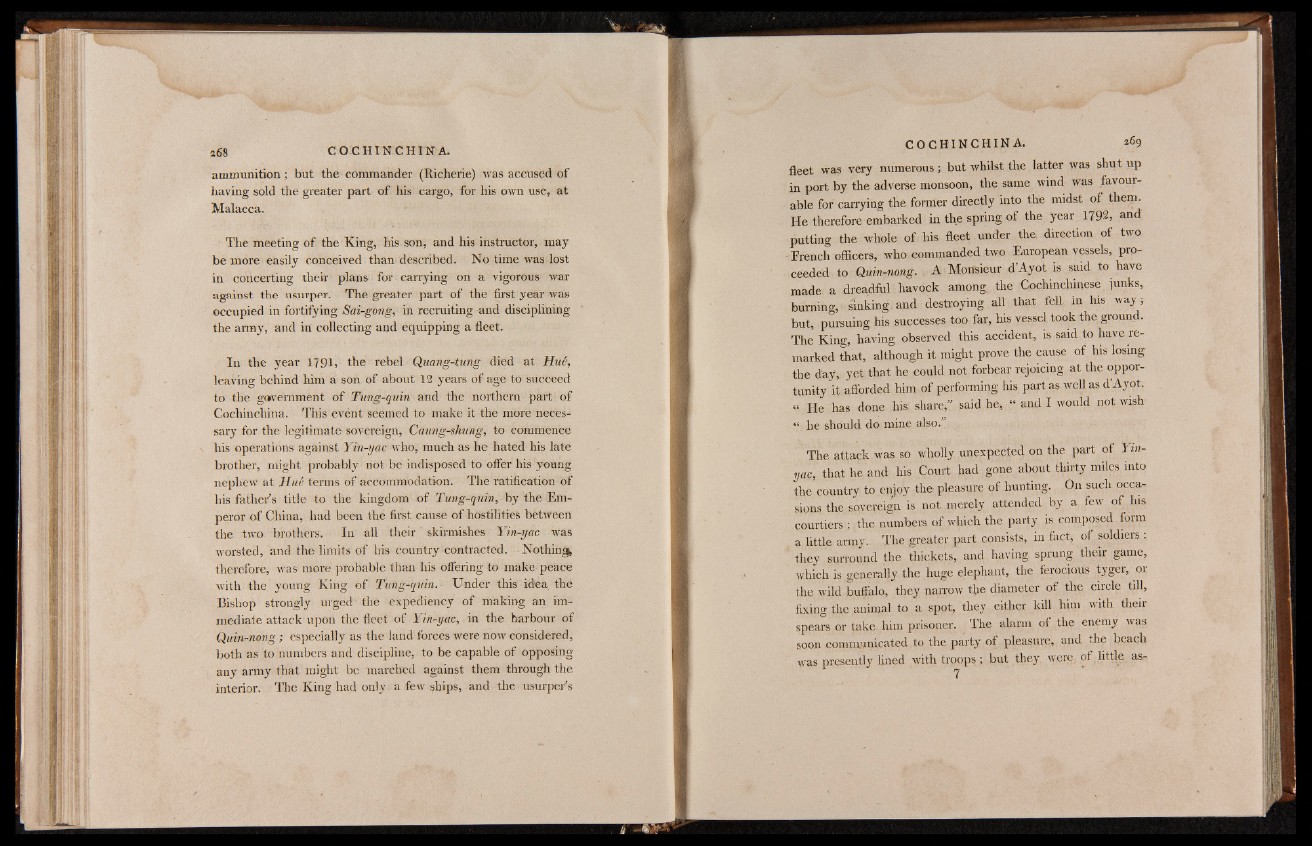
ammunition ; but the commander (Richerie) was accused of
having sold the greater part of his cargo, for his own use, at
Malacca.
The meeting of the King, his son, and his instructor, may
be more easily conceived than described. No time was lost
in concerting their plans for carrying on a vigorous war
against the usurper. The greater part of the first year was
occupied in fortifying Sai-gong, in recruiting-and disciplining
the army, and in collecting and equipping a fleet.
In the year 1791, the rebel Quang-tung died at Hué,
leaving behind him a son of about 12 years of age to succeed
to the government of Tung-quin and the northern part of
Cochinchina. This event seemed to make it the more necessary
for the legitimate sovereign, Caung-shung, to commence
liis operations against Yin-yac who, much as he hated his late
brother, might probably not be indisposed to offer his young
nephew at Hué terms of accommodation. The ratification of
his fathers title to the kingdom of Tung-quin, by the Emperor
of China, had been the first cause of hostilities between
the two brothers. In all their ' skirmishes Yin-yac was
worsted, and the limits of his country contracted. Nothing,
therefore, was more probable than his offering to make peace
with the young King of Tung-quin. Under this idea thé
Bishop strongly urged the expediency of making an immediate
attack upon the fleet of Yin-yac, in the harbour of
Quin-nong ; especially as the land forces were now considered,
both as to numbers and discipline, to be capable of opposing
any army that might be marched against them through the
interior. The King had only a few ships, and the usurper’s
fleet was very numerous; but whilst the latter was shut up
in port by the adverse monsoon, the same wind was favourable
for carrying the former directly into the midst of them.
He therefore embarked in the spring of the year 1792, and
putting the whole of his fleet , under the. direction of two
French officers, who commanded two European vessels* proceeded
to Quin-nong. A Monsieur d’Ayot is said to have
made a dreadful havock among the Cochinchinese junks,
burning, s i n k i n g . and destroying all that fell in his way;
but, pursuing his successes too far, his vessel took the ground.
The King, having observed this accident, is said to have remarked
that, although it might prove the cause of his losing
the day, yet that he could not forbear rejoicing at the opportunity
it afforded him of performing his part as well as d’Ayot.
“ He has done his share,” said he, “ and I would not wish
“ he should do mine also.”
The attack was so wholly unexpected on the part of Ym-
yac, that he and his Court had gone about thirty miles into
the country to enjoy the pleasure of hunting. On such occasions
the soyereign is not merely attended by a few of his
courtiers ; the numbers of which the party is composed form
a little army. The greater part consists, in fact, of soldiers :
. they surround the thickets, and having sprung their game,
which is generally the huge elephant, the ferocious tyger, or
the wild buffalo, they narrow the diameter of the circle till,
fixing the animal to a spot, they either kill him with their
spears or take him prisoner. The alarm of the enemy was
soon communicated to the party of pleasure, and the beach
was presently lined with troops ; but they were of little as-
7